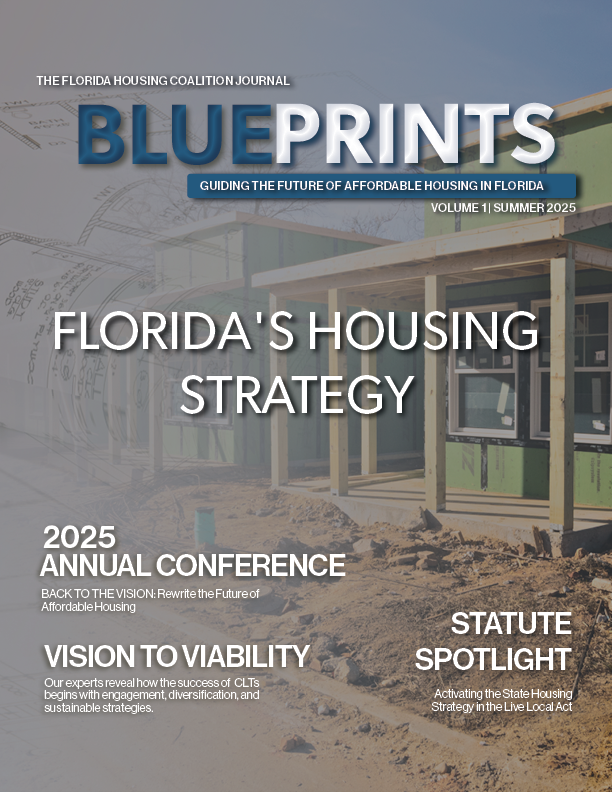This document summarizes the policies in House Bill 923 as of February 24, 2025, organized by policy topic. Be sure to check the date of this document before relying on it – this bill may be amended as it moves forward in the legislative process. This bill is widely expected to be this session’s vehicle for affordable housing tax policies.
1. Amendments to Existing Property Tax Exemptions for Affordable Housing (excluding the multifamily middle market property tax exemption which is discussed below in section 2)
The bill proposes the following amendments to s. 196.1978 of the Florida Statutes – the section of Florida law that provides affordable housing property tax exemptions. The amendments proposed specifically to the multifamily middle market exemption are discussed in Section 2.
- Newly defines “financial beneficiary” and “multifamily project” as used in s. 196.1978.
- Extends the affordable housing property tax exemption for property owned by a 501(c)(3) to property owned by governmental entities. (Currently at s. 196.1978(1)).
- Extends the 501(c)(3) land exemption for land leased under 99-year ground lease to provide affordable housing to 1) include both land and improvements as exempted from property taxes; and 2) to include property owned by a governmental entity. (Currently at s. 196.1978(1)(b)).
- Amends the FHFC-funded project property tax exemption (the 15-year exemption) at s. 196.1978(2) to:
- Expand multifamily project eligibility from projects with more than 70 affordable units to projects with only at least one affordable unit.
- Expand eligibility to adaptive reuse projects that use at least 20% of the project’s residential units to provide affordable housing.
- Expands eligibility to projects subject to an agreement with a housing finance authority (HFA).
- Amends the exemption for FHFC-funded projects that provide 99 years of affordability at s. 196.1978(4) to:
- Expand multifamily project eligibility from projects with more than 70 affordable units to projects with only at least one affordable unit.
- Expand eligibility to adaptive reuse projects that use at least 20% of the project’s residential units to provide affordable housing.
- Expands eligibility to projects subject to an agreement with a housing finance authority (HFA).
- Amend the penalty provisions if the project ceases to provide affordable housing.
2. Amendments to the Multifamily Middle Market Property Tax Exemption (currently s. 196.1978(3))
The bill proposes the following amendments to the MMM exemption, also referred to as the missing middle property tax exemption. For more information on the existing MMM exemption, see FHC’s publication on Florida’s Affordable Housing Property Tax Exemptions at www.flhousing.org/resource-library.
Project Eligibility.
- Expands multifamily project eligibility from projects with more than 70 affordable units to projects with only at least one affordable unit.
- Also expands eligibility to adaptive reuse projects that use at least 20% of the project’s residential units to provide affordable housing.
- Creates a definition for “improvement to real property” and “substantial rehabilitation” and amends the existing definitions for “newly constructed” and “substantially completed.”
- Expands eligibility to all affordable developments authorized pursuant to s.125.01055 or s. 166.04151 and newly provides a 75 percent exemption for the assessed value of all the affordable units within said development.
Tenant Eligibility.
- Amends tenant eligibility criteria for those who meet the income threshold “at the time the lease is executed.” This language could mean that income documentation would only need to be made at the original lease of the new tenant and the tenant’s income would not need to be monitored on an annual basis after initial occupancy.
Providing the Exemption.
- Provides that if a tenant who resides in an affordable unit’s income increasing above the income threshold (80% or 120% AMI), the unit remains eligible for the exemption if the tenant voluntarily vacates the unit and the unit is rented out to a subsequent income-eligible tenant.
- Provides that a property appraiser must calculate the value of the exemption based on the number of units satisfying the income and rent limits.
Pre-Approval by the County Property Appraiser
- Creates a new pre-approval process where a property owner can request a verification letter from their county property appraiser that, if constructed and leased as described in the site plan, the plan qualifies for the exemption. Provisions for this new process include:
- The property appraiser must issue a verification letter or explain why the project is ineligible within 30 days of receipt.
- The verification letter is prima facie evidence of eligibility for the exemption.
- A project receiving a verification letter is exempt from a subsequent opt-out by a taxing authority.
Renewing the Exemption.
- Makes it clear that a property owner of an eligible project may revise the list of units seeking the exemption so long as the project continues to meet the minimum number or percentage of units dedicated to affordable housing.
Amending the Opt-Out for the 80-120% AMI Exemption.
- For a taxing authority to opt-out, the three most recent annual Shimberg Center for Housing Studies Report must show a deficit of affordable units at 0-120% AMI for the MSA or region.
- Prohibits taxing authorities from using their emergency enactment procedures to opt-out.
- Makes it clear that a multifamily project that was granted the exemption is grandfathered-in despite a taxing authority opting out.
- Exempts projects that receive approval under the Live Local Act’s land use preemption for affordable housing in commercial, industrial, and mixed-use areas before the adoption or renewal of the opt-out.
- Requires taxing authorities to conduct their own assessment on their current need for affordable housing for up to 80% AMI, including supply and demand projects for at least the next 5 years before being able to opt out.
- Requires taxing authorities to provide notice to FHFC of their opt out.
- Creates a new cause of action for a multifamily property owner that is adversely affected by a taxing authority’s opt-out.
Additional Provisions.
- If a property receiving the exemption is foreclosed, the foreclosing party may elect to void the 3-year affordability term.
3. Amendments to the Local Option Property Tax Exemption at s. 196.1979
- Expands eligibility to Expand eligibility to adaptive reuse projects that use at least 20% of the project’s residential units to provide affordable housing.
- Authorizes local governments to provide the optional exemption to multifamily developments as small as five units.
- Allows developments approved under s. 125.01055 or s. 166.04151 to abate up to 20 percent of the property’s ad valorem tax for a period of 10 years by paying an amount equal to 20 percent of the total amount of the ad valorem property taxes to be abated at the time a building permit is issued.
- Requires FHFC to adopt rules establishing standards for monitoring and compliance and a county or city may not impose compliance monitoring requirements more stringent than the standards adopted by FHFC
4. Expands the use of the Infrastructure Surtax for Affordable Housing Purposes
The bill proposes expanding the infrastructure surtax statute at s. 212.055 to clearly allow local governments to use their infrastructure surtax revenue on “any expenditure to construct or rehabilitate housing that, for a period of at least 30 years, is affordable as defined in s. 420.0004.” Under current law, the law is only expressly clear that IS revenue can be used for land acquisition for affordable housing purposes.
5. Florida Housing Revitalization Act
The bill proposes creating a new corporate income tax credit for the rehabilitation of a certified historic structure into affordable or workforce housing. The tax credit is allowed for an amount equal to 20 percent of total qualified expenses for an eligible project. An eligible project is one that is the rehabilitation of a certified historic structure (as defined in the bill), the total qualifying expenses exceed $5,000, the historic structure is to be used exclusively for affordable or workforce housing, among other criteria.
6. Additional Policies
- Amends the definition of “qualified contract” at s. 420.503(36) to require FHFC to deem a bona fide contract to be a qualified contract at the time the second earnest money deposit is deposited in escrow in accordance with the terms of the bona fide contract.
- Provides a definition of “urban infill” for purposes of deploying funds under the Innovative SAIL program funded by the Live Local Act at s. 420.50871 and prevents FHFC from requiring a project financed under the Innovative SAIL program to use low-income housing tax credits or tax-exempt bond financing.




